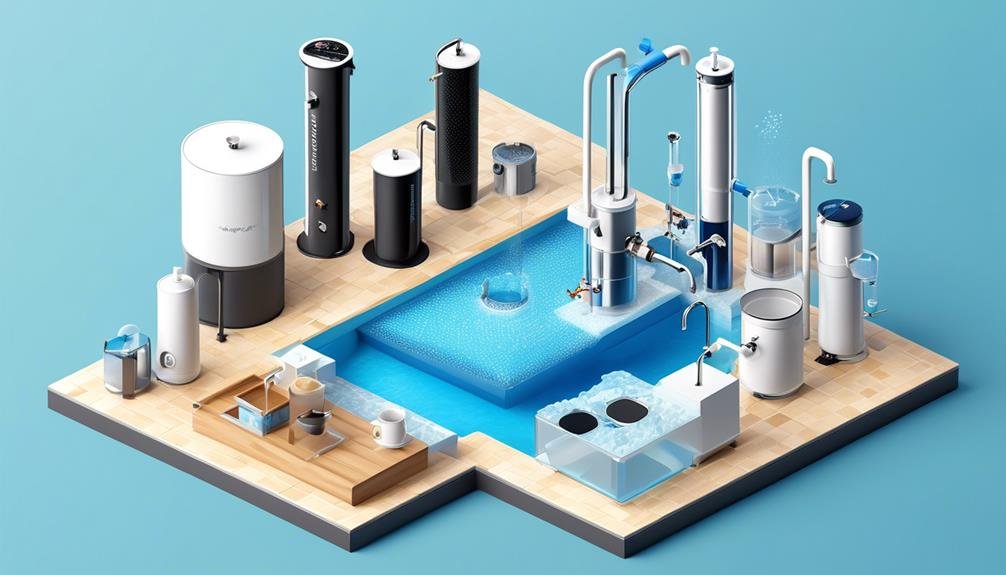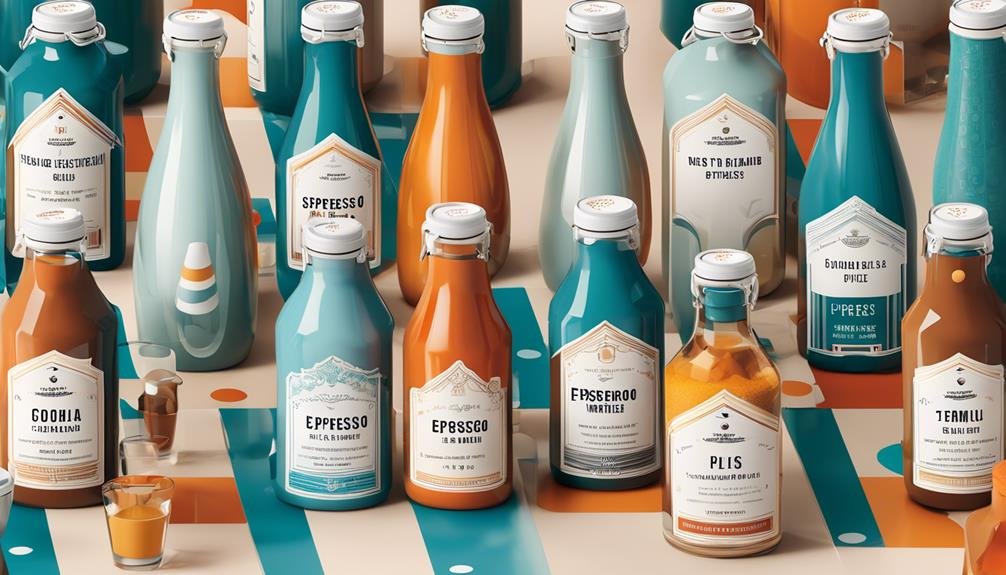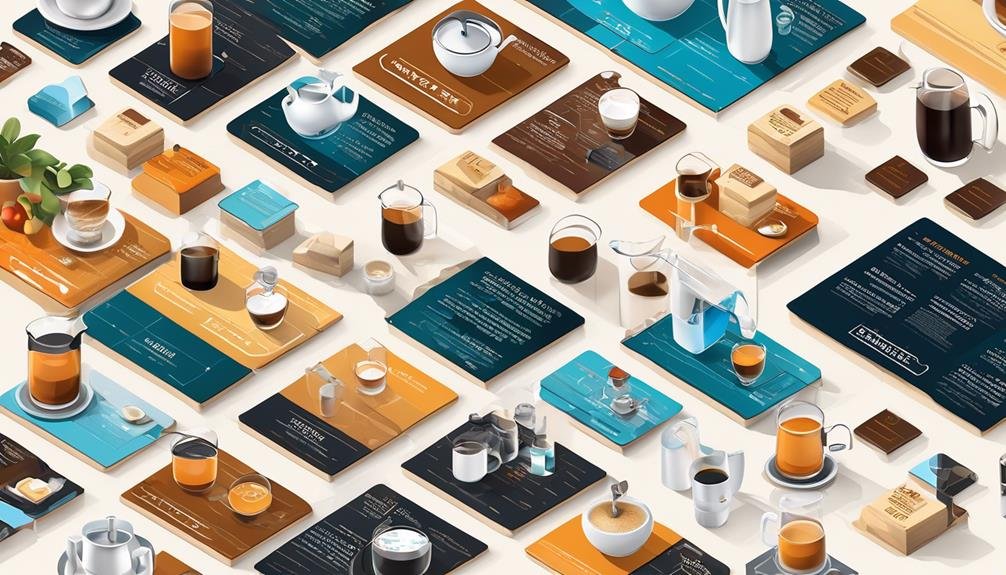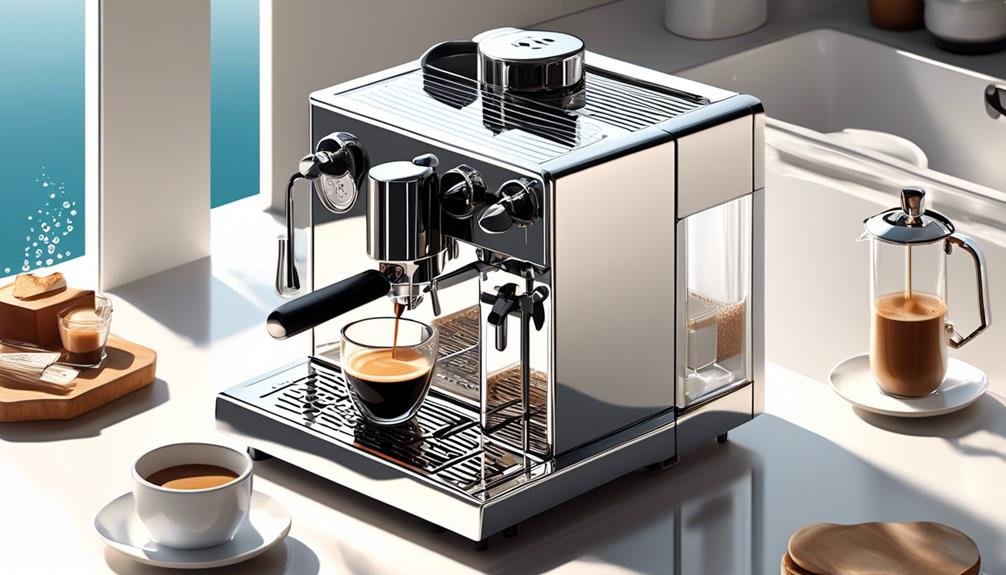They say that water is the essence of life, and when it comes to brewing espresso, the choice of water can make all the difference.
But what exactly is the best water for brewing espresso? Well, it's not as simple as just turning on the tap and filling up your machine. There are factors to consider, like the presence of impurities, the mineral composition, and even the temperature.
In this discussion, we will explore the importance of water quality, the impact of Total Dissolved Solids (TDS), the different filtration methods available, and even some water recipes that can enhance the flavor and consistency of your espresso.
So, grab a cup of your favorite brew and let's dive into the world of water and espresso.
Key Takeaways
- Using filtered water is highly recommended for brewing espresso to remove impurities and chemicals that can negatively impact the taste of coffee.
- Water with a mineral content of around 150-200 ppm is generally recommended for brewing espresso, as minerals such as calcium and magnesium contribute to the extraction process.
- Distilled or reverse osmosis water lacks the necessary minerals for extracting the full flavor potential of coffee, so adding minerals back may be necessary to achieve the desired taste.
- Bottled water with controlled mineral content, such as Volvic, can provide the right balance for a flavorful brew and enhance the overall quality of coffee.
Importance of Water Quality
To ensure optimal extraction and flavor in your espresso, the importance of water quality can't be overstated. Water is the main component of coffee, making up about 98% of the final cup. It plays a crucial role in the brewing process, affecting the taste, aroma, and overall quality of your espresso.
When it comes to brewing the best espresso, using filtered water is highly recommended. Tap water often contains impurities and chemicals that can negatively impact the taste of your coffee. A good quality water filter can remove these impurities, resulting in a cleaner and more flavorful cup of espresso.
In addition to using a filter, the mineral content of the water is also important. Minerals such as calcium and magnesium contribute to the extraction process by interacting with the coffee grounds. They help extract the desired flavors and oils from the beans, enhancing the overall taste of the espresso. However, too much mineral content can lead to scale buildup in your espresso machine, affecting its performance and longevity.
Finding the right balance of mineral content is key. Water with a mineral content of around 150-200 parts per million (ppm) is generally recommended for brewing espresso. This range allows for optimal extraction without causing scale buildup.
Understanding TDS and Its Impact
Understanding TDS and its impact on water quality is essential for achieving consistent and flavorful coffee or espresso. Total dissolved solids (TDS) refers to the concentration of all dissolved substances in water, such as minerals, salts, and metals, which can greatly influence the taste and brewing properties of water.
Here are three key points to help you understand the significance of TDS:
- Distilled or reverse osmosis water: These types of water have very low TDS, as they've undergone processes that remove most minerals and impurities. While they may seem ideal for brewing, they lack the necessary minerals to extract the full flavor potential of coffee.
- TDS content: The ideal range for brewing water is between 75-250 parts per million (ppm) of TDS. Water within this range provides the right balance of minerals, allowing for optimal extraction and flavor development.
- Impact of reverse osmosis: Reverse osmosis filtration systems are popular for purifying water, but they can significantly reduce TDS levels. If your water has low TDS due to such filtration, you may need to add minerals back to achieve the desired TDS range for brewing.
Choosing the Right Water Filtration Method

When selecting the most appropriate water filtration method for brewing espresso, it's crucial to consider the quality of the water and its impact on coffee extraction. Understanding the importance of water quality, including minerals like magnesium and calcium, is key to achieving better brewing results with specialty coffee. One way to assess water quality is by measuring total dissolved solids (TDS), which can be done using a TDS meter. This measurement serves as a starting point for water experimentation.
To find a suitable water filtration solution for coffee brewing, various options are available. These include water filter pitchers, bottled water, pre-made mineral mixes, bypass water, and custom water. The goal is to achieve consistency in water quality, as it greatly influences the taste and flavor of the final espresso. It's important to consider individual circumstances, preferences, and the availability of water options when choosing a filtration method.
Additionally, factors such as water temperature, water-to-coffee ratio, and evolving preferences in water for coffee should be taken into account. It's also crucial to understand the effects of water on espresso machines, as hard water can cause scaling and reduce the lifespan of the machine. By choosing the right water filtration method, you can ensure optimal brewing conditions and enhance the overall espresso experience.
Exploring the Benefits of Bottled Water
Bottled water offers a convenient and reliable solution for achieving optimal water quality in coffee brewing. When it comes to making the best coffee or espresso, the type of water you use can have a significant impact on the taste and quality of your brew. Here are some benefits of using bottled water for your coffee brewing:
- Clean and Chlorine-free: Bottled water is typically clean and free from chlorine, which can affect the taste of your coffee. The absence of chlorine ensures that the natural flavors and aromas of the coffee beans aren't compromised.
- Controlled Mineral Content: Most bottled waters have either very high mineral content or close to none. While water with no minerals isn't ideal for coffee brewing, water with too many minerals can also negatively impact the taste. Look for bottled water with mineral levels in the range of 50 to 157 mg/l, as this range provides the right balance of minerals for a flavorful brew.
- Consistent Hardness and Alkalinity: Bottled water allows you to have control over the hardness and alkalinity levels, which are essential for coffee extraction. Coffee beans require specific conditions to release their flavors fully, and using bottled water ensures that these conditions are met consistently.
One recommended brand is Volvic, which has a mineral content of 130 mg/l, providing the ideal balance for brewing coffee. By using bottled water with the right mineral content, you can enhance the flavor and quality of your coffee, resulting in a more satisfying brewing experience.
Pre-Made Formulas for Optimal Espresso Brewing

To achieve optimal water quality for brewing espresso, pre-made formulas offer a convenient and consistent solution. Brands like Third Wave Water and Aquacode have developed mineral mixes specifically designed for espresso brewing. These pre-made formulas ensure that the water used in the brewing process contains the ideal balance of minerals, resulting in a better extraction of flavors from the coffee grounds.
For those who prefer to use tap water, a water filter pitcher like Brita can be used to reduce the hardness of the water. Hard water can negatively impact the taste of espresso by overpowering the delicate flavors of the coffee beans. By using a water filter pitcher, you can soften the water and improve the overall quality of your brew.
Alternatively, bottled water can provide a convenient option for home baristas seeking consistent water quality. Brands like Volvic or Ashbeck are known for their low mineral content and neutral pH levels, making them suitable for espresso brewing. Simply using bottled water instead of tap water can eliminate the need for additional filtration or mineral additives.
Another option to consider is bypass water, which is a mix of reverse osmosis (RO) water and a small amount of tap water. This blend can provide the ideal balance of mineral content without the need for pre-made formulas or extensive filtration systems.
Considering Bypass Water Options
For optimal water quality in espresso brewing, one option to consider is the use of bypass water, which combines reverse osmosis (RO) water with a small amount of tap water. This method allows you to have control over the water composition and achieve the desired characteristics for brewing excellent espresso.
Here are some key factors to consider when using bypass water:
- Distilled or Reverse Osmosis (RO) Water: Using distilled or RO water as the base ensures that impurities and minerals are removed, giving you a clean slate to work with.
- Tap Water: Adding a small amount of tap water to the RO water helps balance the mineral content. Tap water contains minerals that contribute to the extraction process, enhancing the flavor profile of your espresso.
- Water for Coffee: It's important to note that not all water is suitable for coffee brewing. Minerals like calcium and magnesium play a crucial role in extracting flavor compounds from coffee grounds, so finding the right balance is essential.
Water Recipes for Enhancing Flavor and Consistency

Enhance the flavor and consistency of your coffee and espresso by using water recipes with a balanced mineral composition and filtered or bottled water.
The quality of water used in brewing plays a crucial role in the taste and extraction of your favorite beverages. When it comes to water selection, there are a few options to consider.
First, you can opt for distilled water, which has no minerals and can provide a blank canvas for your brewing process. However, it's important to note that using distilled water alone may result in a lack of flavor complexity.
Alternatively, you can utilize filtered or bottled water with a balanced mineral composition. This helps to provide the necessary minerals like calcium for optimal extraction and flavor development. When using tap water, consider employing a charcoal filter to reduce impurities and minimize scale build-up in your brewing equipment.
Additionally, you can explore pre-made mineral mixes like Third Wave Water or Aquacode to ensure consistency and convenience in your water solution for brewing.
Frequently Asked Questions
What Type of Water Is Best for Espresso?
Filtered or bottled water with suitable mineral composition and pH level is best for brewing espresso. The right water can enhance coffee extraction, flavor, and consistency. Use TDS meters and pre-made mineral mixes for convenience and consistency.
Is Distilled Water Better for Espresso Machine?
Distilled water is not better for your espresso machine. Its low mineral content can lead to corrosion and damage to metal parts. It is recommended to use water with balanced mineral content to ensure optimal performance and longevity of your machine.
Is Filtered or Tap Water Better for Espresso?
Filtered water is generally better for brewing espresso than tap water. It helps reduce impurities and provides a more suitable mineral composition, resulting in improved coffee quality.
What Is the Best Water Profile for Espresso?
The best water profile for brewing espresso includes clean, soft water with a pH of 7.0, alkalinity of 40 ppm, and calcium hardness of 50-175 ppm CaCO3. Using bottled water like Volvic or filters can enhance the taste of your coffee.
Conclusion
In conclusion, the quality of water used for brewing espresso is crucial for achieving optimal flavor and consistency.
It's recommended to use filtered or bottled water that's free from impurities and has a balanced mineral composition. Avoiding ultra pure water, such as distilled or reverse osmosis water, is important to prevent corrosion in espresso machines.
Water filters can improve water quality and protect the machine from scale buildup.
Considering pre-made formulas and water recipes can further enhance the flavor of espresso.




